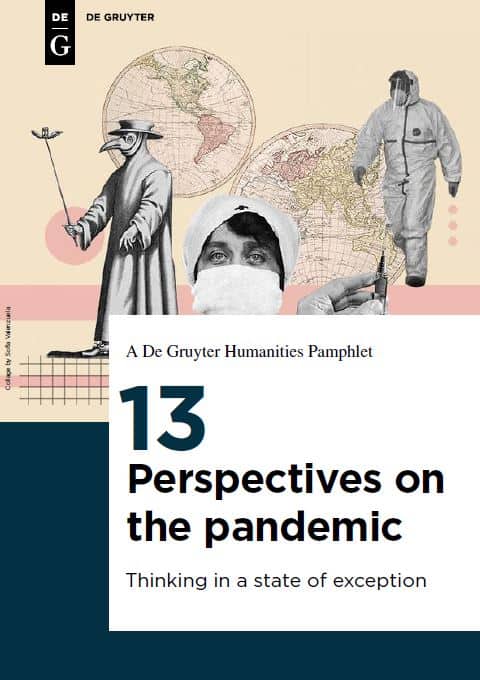Stoic Responses to the Covid-19 Pandemic
The corona pandemic has affected all of us and raised many questions about the ways we organise our lives. Famed for their ability to cope with such crises, Greek and Roman Stoics offer an intriguing perspective on the challenging questions facing us.
This essay was first published in the free digital pamphlet 13 Perspectives on
the Pandemic: Thinking in a state of exception.
The Stoics would probably have little patience for the suffering and anxieties caused by the current pandemic. In a world of endemic violence and social insecurity, the Stoics preached an attitude of indifference towards such trivial matters as death, disease and the loss of livelihood. Happiness, they claimed, only depends on virtue, i.e. the insight and mindset that makes you “do the right thing”.
When we get upset by blows of fortune, such as those experienced by many in recent months, it is because we fail to see that it is our response to these events, not the events themselves, that matter. The key to happiness, according to the Stoics, is to therefore attain a critical awareness and control over how we respond to different situations. Suffering only arises if we accept it as an appropriate emotional response, and so we can also choose not to suffer.
Stone-Cold Virtue and Emotion Control
Being told that your distress is self-imposed and ultimately misplaced won’t do you much good, I suspect, if you are plugged to a ventilator fighting for your life. Now that the imminent danger of the COVID-19 pandemic is slowly giving way to a prolonged state of caution and restraint, however, I believe that we can profit from taking a Stoic perspective on the worries and discontent that are boiling up in our homes and societies.
“Only by becoming aware of the values that underlie our actions and emotions can we start changing our behaviour.”
On their analysis, our emotional responses are largely automatic, the result of underlying fears and desires. Eliminating unwanted emotional reactions therefore involves an assiduous and critical engagement with our desires and the thought patterns that structure them. Only by becoming aware of the values that underlie our actions and emotions can we start changing our behaviour.
The current state of emergency is in many ways conducive to these kinds of reflection. Hardship and constraints, the Stoic assumed, make us see more clearly what we value and thereby allows us to subject these value-judgements to critical scrutiny. The point, however, is not to rid ourselves of desires, but to put us in control of them and ensure that they are consistent and conducive to the well-being of ourselves and the world we partake in.
A Crisis of Value
Like all crises, this one has worked like a developing agent exposing the unsaid priorities underlying our public and personal policies and forcing us to reconsider them. Most of us have probably had personal revelations about the habits and patterns that inform our everyday behaviour. More broadly, the pandemic has laid bare the deep inequalities and incongruities in our social, economic and healthcare systems, and raised questions about their justification. On the positive side, it has reminded us of the benefits of a less intensely exploited environment and the importance of cultural life.
The crucial insight that the Stoics bring to the table, however, is that this new awareness is only of fleeting significance if it does not effect a lasting change in the structure of our language and thoughts. They framed this process as an almost physical exercise. We need to work out and redefine the concepts we use, establish their mutual relations and constantly train ourselves in applying them correctly to the things we observe. This is hard work, but if we succeed it brings us the control over our actions and emotions that the Stoics associated with virtue.
With its stress on the importance of language and discourse this theory has a strikingly modern ring to it. What I like about it, however, is its almost naïve concreteness and practicability. The concepts are physically inside our heads (or in fact, the Stoics would say, chests) and so we have a power to change them.
Working Out the Rest for Ourselves
The jury is still out on the COVID-19 crisis’ lasting impact on how we organise our lives and societies and opposing bids to define its significance are already fighting to establish themselves. This is all well. We can and should disagree about the values informing our actions and policies, how they are best served, and how they weigh against each other; but for such debates to be meaningful, the Stoics would insist, we must first get clear about the values being promoted by the opposing sides of these debates.
This crisis has given us a historical opportunity to reconsider our priorities. As the Stoics clearly saw, this takes hard work and constant reminders, but if, in the wake of this pandemic, we could achieve just a little more awareness of the values determining public policies, this would be a truly significant result of a terrible tragedy and our celebration of its “everyday heroes” could soon start sounding a lot less hollow.
Learn more in this related title from De Gruyter
[Title image via Wikimedia Commons/Public Domain]
